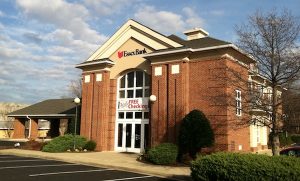
A local Essex Bank branch. (Photo by Michael Schwartz)
Another local bank just got TARP off its back.
Essex Bank and its holding company on Wednesday bought their way out of the once-controversial Troubled Asset Relief Program. It had been the only local bank remaining in the program.
The Glen Allen-based bank used a loan from SunTrust to buy back the remaining $10.86 million worth of TARP stock from the U.S. Treasury. The loan carries an interest rate of about 3.7 percent, a far better deal for Essex than the 9 percent dividends it was paying on TARP.
The payoff allows Essex to fully shed its largest piece of the government-related baggage that many banks had lingering from the recession.
“This was the last piece of all the problems that have plagued us,” said Rex Smith, chief executive of Essex Bank and its Community Bankers Trust Corp. holding company. “It’s great to get that off your shoulders.”
A return to steady profits after a few tough years allowed the $1.08 billion bank in late 2012 to work its way out of a restrictive written agreement with state and federal regulators.
Last summer, it began chipping off chunks of TARP when it bought back about $7 million in preferred stock from the Treasury in two transactions. The bank took $17.6 million in TARP capital in late 2008.
It also recently moved into a new headquarters in the refurbished former Circuit City home base at Deep Run III.
“I’m very optimistic,” Smith said. “Things are picking up in the markets we’re serving, and we have good loan demand. Knock on wood.”
Essex still has one final piece of TARP that will soon be retired. The government still owns the rights to 780,000 shares of the bank’s publicly traded common stock. Smith said Essex will negotiate with Treasury to buy back those remaining shares. It will take another draw from the SunTrust loan for that deal. Those shares had an initial exercise price of $3.40 per share.
Created in the early stages of the financial crisis to give banks a capital cushion against the recession, TARP made the federal government a preferred shareholder of hundreds of banks across the country.
The government pumped a total of $191 million into eight local banks as a result.
Some bought their way out, while others such as Midlothian-based Village Bank and First Capital Bank, saw their TARP shares sold by Treasury to mystery buyers in an open auction.

A local Essex Bank branch. (Photo by Michael Schwartz)
Another local bank just got TARP off its back.
Essex Bank and its holding company on Wednesday bought their way out of the once-controversial Troubled Asset Relief Program. It had been the only local bank remaining in the program.
The Glen Allen-based bank used a loan from SunTrust to buy back the remaining $10.86 million worth of TARP stock from the U.S. Treasury. The loan carries an interest rate of about 3.7 percent, a far better deal for Essex than the 9 percent dividends it was paying on TARP.
The payoff allows Essex to fully shed its largest piece of the government-related baggage that many banks had lingering from the recession.
“This was the last piece of all the problems that have plagued us,” said Rex Smith, chief executive of Essex Bank and its Community Bankers Trust Corp. holding company. “It’s great to get that off your shoulders.”
A return to steady profits after a few tough years allowed the $1.08 billion bank in late 2012 to work its way out of a restrictive written agreement with state and federal regulators.
Last summer, it began chipping off chunks of TARP when it bought back about $7 million in preferred stock from the Treasury in two transactions. The bank took $17.6 million in TARP capital in late 2008.
It also recently moved into a new headquarters in the refurbished former Circuit City home base at Deep Run III.
“I’m very optimistic,” Smith said. “Things are picking up in the markets we’re serving, and we have good loan demand. Knock on wood.”
Essex still has one final piece of TARP that will soon be retired. The government still owns the rights to 780,000 shares of the bank’s publicly traded common stock. Smith said Essex will negotiate with Treasury to buy back those remaining shares. It will take another draw from the SunTrust loan for that deal. Those shares had an initial exercise price of $3.40 per share.
Created in the early stages of the financial crisis to give banks a capital cushion against the recession, TARP made the federal government a preferred shareholder of hundreds of banks across the country.
The government pumped a total of $191 million into eight local banks as a result.
Some bought their way out, while others such as Midlothian-based Village Bank and First Capital Bank, saw their TARP shares sold by Treasury to mystery buyers in an open auction.
The appointment of Rex Smith as CEO was the single most brilliant move the board has ever done.
Good job Rex.